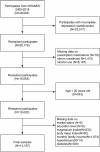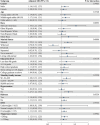Magnesium depletion score and depression: a positive correlation among US adults
- PMID: 39564360
- PMCID: PMC11573693
- DOI: 10.3389/fpubh.2024.1486434
Magnesium depletion score and depression: a positive correlation among US adults
Abstract
Background: The Magnesium depletion score (MDS) serves as a novel metric for quantifying magnesium deficiency in the human body, comprehensively assessing four indicators: diuretic use, proton pump inhibitor use, estimated glomerular filtration rate, and alcohol abuse. However, there have been no studies examining the potential association between MDS and depression.
Methods: The study population for this cross-sectional study comprised adults from the National Health and Nutrition Examination Survey database from 2009 to 2018. Participants with a score of 10 or above on the Patient Health Questionnaire-9 were defined as having depression. We employed multivariable logistic regression models to investigate the association between MDS and depression. Furthermore, subgroup analyses were conducted to assess potential differences in this association among populations with diverse characteristics.
Results: A total of 13,197 participants were included in this study. After adjusting for all covariates, a significant positive correlation was observed between MDS and depression. Specifically, for every unit increase in MDS, the likelihood of developing depression increased by 13% (OR = 1.13, 95% CI: 1.04-1.22, p = 0.0025). This positive correlation was consistent across MDS groups, with a 19% increase in depression likelihood in the medium group (OR = 1.19, 95% CI: 1.01-1.41, p = 0.0404) and a 58% increase in the high group (OR = 1.58, 95% CI: 1.21-2.07, p = 0.0007), using the low subgroup as a reference. Subgroup analyses revealed significant differences in the relationship between MDS and depression across races, marital statuses, and hypertension status.
Conclusion: Our study has uncovered a significant positive association between MDS and depression. Reducing MDS in individuals may play a positive role in both the prevention and treatment of depression.
Keywords: NHANES; depression; magnesium; magnesium depletion score; micronutrients.
Copyright © 2024 Zhao and Jin.
Conflict of interest statement
The authors declare that the research was conducted in the absence of any commercial or financial relationships that could be construed as a potential conflict of interest.
Figures
Similar articles
-
The Association between Magnesium Depletion Score and Hypertension in US Adults: Evidence from the National Health and Nutrition Examination Survey (2007-2018).Biol Trace Elem Res. 2024 Oct;202(10):4418-4430. doi: 10.1007/s12011-023-04034-y. Epub 2023 Dec 26. Biol Trace Elem Res. 2024. PMID: 38147232
-
Association between magnesium depletion score and prevalence of hyperuricemia in American adults: a study based on NHANES 2007-2018.Front Endocrinol (Lausanne). 2025 Feb 6;16:1438639. doi: 10.3389/fendo.2025.1438639. eCollection 2025. Front Endocrinol (Lausanne). 2025. PMID: 39980850 Free PMC article.
-
Association of magnesium depletion score with increased stroke incidence and mortality risks in a comprehensive analysis.Sci Rep. 2025 Feb 25;15(1):6790. doi: 10.1038/s41598-025-91227-1. Sci Rep. 2025. PMID: 40000741 Free PMC article.
-
Magnesium Depletion Score and Metabolic Syndrome in US Adults: Analysis of NHANES 2003 to 2018.J Clin Endocrinol Metab. 2024 Nov 18;109(12):e2324-e2333. doi: 10.1210/clinem/dgae075. J Clin Endocrinol Metab. 2024. PMID: 38366015 Free PMC article.
-
Associations between magnesium depletion score and depression among individuals aged 20 to 60 years.J Trace Elem Med Biol. 2024 Dec;86:127543. doi: 10.1016/j.jtemb.2024.127543. Epub 2024 Oct 9. J Trace Elem Med Biol. 2024. PMID: 39406123
Cited by
-
Association between magnesium depletion score and prostate cancer.Sci Rep. 2025 Feb 8;15(1):4801. doi: 10.1038/s41598-025-89506-y. Sci Rep. 2025. PMID: 39922926 Free PMC article.
References
-
- WHO . Depressive disorder (depression). (2023). Available at: https://www.who.int/news-room/fact-sheets/detail/depression (Accessed June 1, 2024).
MeSH terms
Substances
LinkOut - more resources
Full Text Sources
Medical
Research Materials
Miscellaneous



